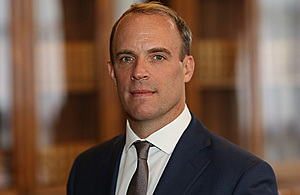Travel Advice against all non-essential travel: Foreign Secretary's statement, 17 March 2020
Foreign Secretary Dominic Raab gave a statement advising against all non-essential travel overseas in response to the coronavirus (COVID-19) pandemic.

The Rt Hon Dominic Raab MP
The Foreign and Commonwealth Office advises against all non-essential travel overseas. Read our latest coronavirus travel advice.
Today the Foreign & Commonwealth Office (FCO) has advised against all non-essential international travel, initially for a period of 30 days. This advice takes effect immediately.
This change in travel advice reflects the pace at which other countries are either closing their borders or implementing restrictive measures in response to the global coronavirus pandemic.
Often there is little or no notice when countries take these steps and restrictions are also being imposed in areas where no cases of coronavirus have yet been reported. They are therefore very difficult to predict.
Travel Advice against all non-essential travel: UK Foreign Secretary statement
British people who decide that they still need to travel abroad should be fully aware of the increased risks of doing so. That includes the risk that they may not be able to get home, if travel restrictions are put in place. Anyone still considering travel needs to be realistic about the level of disruption they are willing and able to endure, and to make decisions in light of the unprecedented conditions we face.
We are not currently advising British people to immediately return to the UK if they are overseas, except for a few countries detailed in our travel advice. However, British people should keep in mind that flights may be cancelled at short notice or other travel restrictions may be put in place by foreign governments.
If people do want to return to the UK soon, then they need to take account of the fast moving situation and plan accordingly, while flights remain available in many places.
Foreign Secretary, Dominic Raab, said:
UK travellers abroad now face widespread international border restrictions and lock downs in various countries. The speed and range of those measures across other countries is unprecedented.
So I have taken the decision to advise British nationals against all non-essential international travel.
Whether travel is essential or not is a personal decision and circumstances differ from person to person. It is for individuals themselves to make an informed decision based on the risks and FCO advice. Anyone still planning to travel should check the validity of their travel insurance.
UK inward and outward travel has already fallen by a significant amount since the outbreak of coronavirus. Ryanair, Virgin and EasyJet have cut flights by 80% this month and IAG has decreased capacity by 75%.
The UK’s extensive diplomatic network is continuing to work around the world to support British people at the greatest risk of exposure to the virus.
In the last week alone 430 changes have been made to FCO Travel Advice.
We will continue to do everything in our power to get those British nationals affected the care, support and advice they need. We are also working urgently to ensure international governments have sensible plans to enable the return of British and other travellers and, crucially, that they keep borders open for enough time to allow people to return home on commercial flights.
British nationals who become ill overseas should, in the first instance, seek care and support from the country they are in.
This guidance follows the domestic measures announced by the Prime Minister on Monday and forms part of the national effort to meet the international challenge presented by coronavirus.
For British people travelling and living overseas during the coronavirus (COVID-19) pandemic, see our coronavirus travel advice.